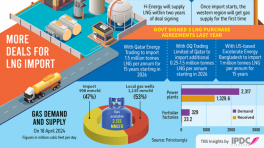US and Israel ramp up pressure on Iran as diplomacy stalls
US Defense Secretary Lloyd Austin said Biden was "prepared to turn to other options" if the current American policy on Iran fails

The United States and Israel increased pressure on Iran on Thursday as nuclear talks stalled, with Israel's visiting defense chief raising the issue of joint military readiness to be able to halt Iran's nuclear aspirations, if necessary.
Reuters exclusively reported that Thursday's US-Israeli agenda was expected to include discussions about possible military exercises that would prepare for a worst-case scenario to destroy Iran's nuclear facilities should diplomacy fail and if their nations' leaders request it.
US Defense Secretary Lloyd Austin said at the start of the meeting with his Israeli counterpart, Benny Gantz, that Iran had failed to offer constructive diplomatic engagement in talks that President Joe Biden had hoped would revive a 2015 nuclear deal abandoned by his predecessor, Donald Trump.
Austin said Biden was "prepared to turn to other options" if the current American policy on Iran fails.
"We are completely aligned in our commitment to preventing Iran from obtaining a nuclear weapon. This is a national security interest of the United States and Israel and the world," Austin said.
Gantz described Iran, Israel's arch foe, as "the biggest threat to the global and regional peace and stability." After meeting Austin, he held talks with US Secretary of State Antony Blinken.
Iran denies seeking nuclear weapons, saying it wants to master nuclear technology for peaceful purposes. But sweeping demands by Iran's new, hardline government in talks have heightening suspicions in the West that Iran is playing for time while advancing its nuclear program.
With the 2015 deal's nuclear benefits now badly compromised, some Western officials say there is little time left before the foundation of the deal is damaged beyond repair. Under the accord, Iran curbed its nuclear program in return for relief from economic sanctions.
Deterence
The Pentagon declined comment on the Reuters report, which also disclosed an Oct. 25 briefing by Defense Department officials to US National Security Adviser Jake Sullivan on the full range of military options to ensure that Iran would not be able to produce a nuclear weapon.
"I know there's interest in a certain Reuters report," Pentagon spokesman John Kirby told a news briefing.
"I will tell you this: We routinely conduct exercises and training with our Israeli counterparts and I have nothing to announce to or speak to or point to or speculate about today."
State Department spokesman Ned Price told reporters he would not want to "speak to contingency planning" if diplomacy isn't viable in the short term.
Drills by the United States and Israel could address calls by Dennis Ross, a former senior US official and Middle East expert, and others to signal openly to Tehran that the United States and Israel remain serious about preventing it from obtaining a nuclear weapon.
"Biden needs to disabuse Iran of the notion that Washington will not act militarily and will stop Israel from doing so," Ross wrote last month.
Ross also suggested the United States could signal a willingness to give the Israelis the US military's bunker-busting Massive Ordnance Penetrator, a 30,000-pound (13,600-kg)bomb.
Central Intelligence Agency Director Bill Burns said on Monday that the CIA does not believe Iran's supreme leader has decided to take steps to weaponize a nuclear device but noted advances in its ability to enrich uranium, one pathway to the fissile material for a bomb.
Burns cautioned that, even if Iran decided to go ahead, it would still require a lot of work to weaponize that fissile material before attaching a nuclear weapon to a missile or other delivery system.
"But they're further along in their mastery of the nuclear fuel cycle and that's the kind of knowledge that is very difficult to sanction away or make disappear," he said.
US officials have also long worried about America's ability to detect and destroy dispersed components of Iran's nuclear weaponization program once enough fissile material for a bomb were produced.


 Keep updated, follow The Business Standard's Google news channel
Keep updated, follow The Business Standard's Google news channel
















